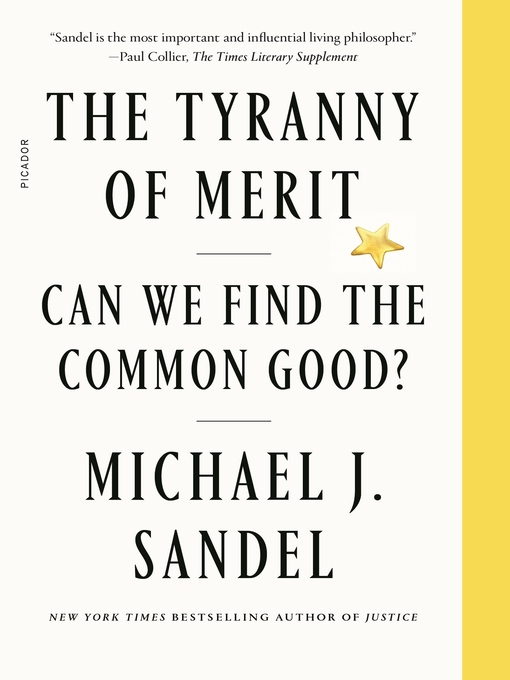
The Tyranny of Merit
What's Become of the Common Good?
کتاب های مرتبط
- اطلاعات
- نقد و بررسی
- دیدگاه کاربران
نقد و بررسی

July 1, 2020
How pernicious assumptions about merit undermine democracy. Harvard professor of political philosophy and host of BBC Radio's "The Global Philosopher," Sandel offers a cogent, penetrating critique of meritocracy, which, he argues persuasively, has trammeled our sense of community and mutual respect. Central to the meritocratic ethic, he writes, is "freedom--the ability to control my destiny by dint of hard work--and deservingness. If I am responsible for having accrued a handsome share of worldly goods--income and wealth, power and prestige--I must deserve them. Success is a sign of virtue. My affluence is my due." However, the author asserts that many factors beyond one's control--family status, quality of education, what skills or talents the market values--shape one's access to wealth and prestige. "Even a fair meritocracy," he adds, "one without cheating or bribery or special privileges for the wealthy, induces a mistaken impression--that we have made it on our own." Sandel deplores the rhetoric--touted by politicians on the left and right--that "valorizes credentialism" by calling for workers to improve their lives by getting a college degree. Such rhetoric, he insists repeatedly, erodes the dignity of work, "undermines social recognition and esteem for those who lack the credentials the system rewards," and leads to unfounded prejudice against those less educated. Loss of social esteem, he maintains, afflicts many aggrieved workers in contemporary America. Sandel's proposals to undermine the tyranny of meritocracy include a lottery system for admission to highly selective colleges, after a diverse and qualified pool is established; and a commitment to creating spaces and places where "citizens from different walks of life encounter one another." The idea of a competitive meritocracy, he writes, "is a hollow political project that reflects an impoverished conception of citizenship and freedom." Sandel's proposals for change are less convincing than his deeply considered analysis. A stimulating examination of a divisive social and political problem.
COPYRIGHT(2020) Kirkus Reviews, ALL RIGHTS RESERVED.

July 6, 2020
The almost sacred principle of meritocracy—that society should (and does) grant position and wealth to the most talented and capable—is tearing people apart, according to this bracing sociopolitical treatise. Harvard political philosopher Sandel (Democracy’s Discontent) argues that the meritocratic creed has created a sharply unequal, globalized economy with soaring incomes for a few and stagnant wages for the rest; government by out-of-touch technocrats indifferent to the concerns of ordinary people; and a populist backlash against meritocratic elites from a working class that’s marginalized and humiliated by a system that says their dim prospects are the just outcome of their lack of smarts and adaptability. Writing in tart prose that decries “the smug conviction of those who land on the top that they deserve their fate, and that those on the bottom deserve theirs,” the author traces the meritocratic concept from Christian theological roots and criticisms of it by philosophers to its deep influence on modern-day rhetoric; the book’s centerpiece is a stinging attack on universities as temples of meritocracy that nevertheless reinforce upper-class privilege rather than helping the disadvantaged. Sandel, however, only makes a few concrete suggestions for dethroning meritocracy, including college admissions by lottery. Still, he offers a rich, incisive analysis of how the meritocratic ideal contributes to contemporary political crises.

























دیدگاه کاربران